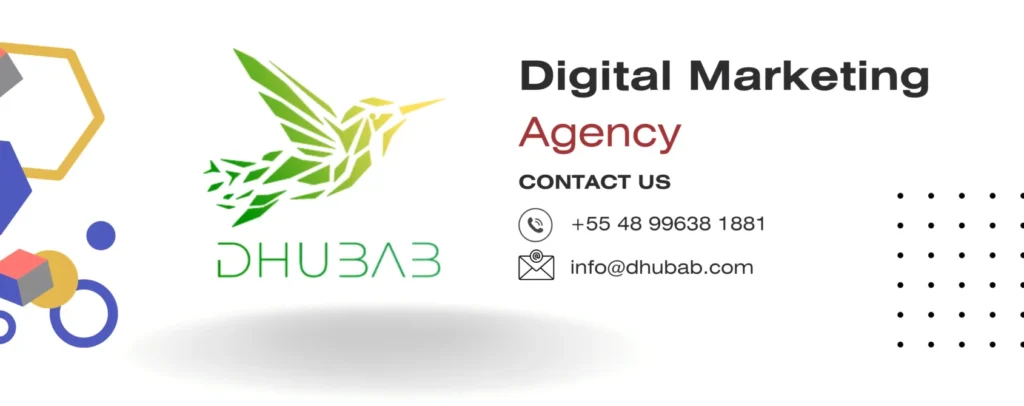Mastering Digital Marketing: 10 Proven Strategies for Success
Mastering Digital Marketing: 10 Proven Strategies for Success. Discover expert insights on web design, SEO, content, and more. Elevate your online presence with Dhubab’s guidance.
Introduction to Mastering Digital Marketing
In the fast-paced world of business, where digital landscapes continually evolve, success often hinges on one’s ability to adapt and thrive in the digital realm. Welcome to “Mastering Digital Marketing: 10 Proven Strategies for Success.” In this comprehensive guide, we’ll navigate the intricate web of digital marketing, unveiling strategies that have stood the test of time and continue to drive businesses towards unprecedented growth.
Defining Mastering Digital Marketing
What Is Mastering Digital Marketing?
Mastering digital marketing is the art and science of leveraging online platforms and technologies to promote products, services, or brands. It’s a multifaceted approach to reaching and engaging with target audiences across various digital channels.
The Essence of Mastering Digital Marketing
At its core, Mastering Digital Marketing revolves around the concept of connecting businesses with their target audience through digital means. Unlike traditional marketing, which relies on physical mediums like print ads and billboards, Mastering Digital Marketing harnesses the power of the internet to deliver messages, capture leads, and drive sales.
The Essence of Defining Digital Marketing
At its core, Defining Digital Marketing is all about elucidating the concept of connecting businesses with their target audience through digital means. In contrast to traditional marketing, which leans on physical mediums like print ads and billboards, Defining Digital Marketing leverages the power of the internet to deliver messages, capture leads, and drive sales.
Evolution of Mastering Digital Marketing
The Journey of Mastering Digital Marketing
The digital marketing landscape has undergone a remarkable evolution since its inception. From humble beginnings to today’s intricate ecosystem, it has continually adapted to technological advancements and shifting consumer behavior.
From the Early Days to Digital Dominance in Mastering Digital Marketing
The journey started with basic online advertising and email campaigns in the early days of the internet. Over time, it has grown into a sophisticated network of strategies, including social media marketing, search engine optimization (SEO), pay-per-click advertising (PPC), content marketing, and more. Each advancement has brought new opportunities and challenges for businesses seeking to make their mark in the digital world.

Mastering Digital Marketing Channels: Segmentation, Targeting, and Positioning
In the world of Mastering Digital Marketing Strategy, success hinges on mastering the art of segmentation, targeting, and positioning to effectively utilize various channels in order to reach and engage with your target audience. Let’s delve into some of the most vital channels that businesses leverage for their Mastering Digital Marketing strategies, while emphasizing the role of segmentation, targeting, and positioning in optimizing these channels.
Mastering Social Media Marketing for Mastering Digital Marketing
Social media platforms have transformed the way businesses connect with their audience. With billions of users worldwide, platforms like Facebook, Twitter, Instagram, and LinkedIn offer powerful opportunities for Mastering Digital Marketing, brand promotion, customer engagement, and lead generation. Effective social media marketing involves creating compelling content, building a loyal following, and leveraging advertising options.
Mastering Search Engine Optimization (SEO) for Mastering Digital Marketing
SEO is the practice of optimizing your online content to improve its visibility in search engine results pages (SERPs). By targeting specific keywords, optimizing on-page elements, and building quality backlinks, businesses can enhance their organic search rankings. SEO is a cornerstone of Mastering Digital Marketing, driving high quality targeted traffic and long-term results.
Mastering Email Marketing for Mastering Digital Marketing
Email marketing remains a highly effective channel for engaging with your audience directly. It involves sending targeted emails to your subscribers with valuable content, offers, and updates. Building and nurturing an email list is crucial for businesses in the context of Mastering Digital Marketing, as it allows for personalized communication and can lead to increased conversions.
Mastering Content Marketing for Mastering Digital Marketing
Content marketing revolves around creating and sharing valuable, relevant content to attract and engage a defined audience. Blog posts, videos, infographics, and more can be used to educate, inform, and entertain your audience. Content marketing builds trust, establishes authority, and fuels other Mastering Digital Marketing channels.
Mastering Pay-Per-Click Advertising (PPC) for Mastering Digital Marketing
PPC advertising is a paid advertising model where businesses bid on keywords, and their ads are displayed to users when those keywords are searched. Platforms like Google Ads and Bing Ads allow for precise targeting and immediate visibility. PPC is ideal for driving traffic and conversions quickly in the context of Mastering Digital Marketing.
Exploring Other Mastering Digital Marketing Channels (Brief Mention)
In addition to the aforementioned channels, there are various other Mastering Digital Marketing channels worth exploring. These may include affiliate marketing, influencer marketing, video marketing, and more. The choice of channels depends on your business goals, target audience, and industry.
Mastering Digital Marketing Strategy
In the ever-evolving digital landscape, a well-crafted Mastering Digital Marketing strategy is the compass that guides businesses toward their goals. This section explores the significance of having a Mastering Digital Marketing strategy and outlines the essential steps to develop an effective one.
The Significance of Mastering Digital Marketing Strategy
A Mastering Digital Marketing strategy serves as the foundation upon which successful campaigns are built. It provides clarity, direction, and purpose to your efforts in the digital realm. Here’s why having a Mastering Digital Marketing strategy is crucial:
- **Alignment:** It aligns your Mastering Digital Marketing efforts with your business objectives, ensuring that every action contributes to your overarching goals.
- **Efficiency:** It streamlines your Mastering Digital Marketing activities, allowing you to make the most of your resources and budget.
- **Focus:** It helps you target the right audience with the right message at the right time, increasing the likelihood of success.
- **Measurement:** It provides a framework for measuring the effectiveness of your Mastering Digital Marketing campaigns and making data-driven improvements.
Steps to Develop an Effective Mastering Digital Marketing Strategy
Developing a robust Mastering Digital Marketing strategy requires careful planning and consideration. Here are the key steps to create an effective Mastering Digital Marketing strategy:
- **Define Your Goals:** Begin by clearly defining your business objectives. Whether it’s increasing website traffic, boosting sales, or enhancing brand awareness, your goals will shape your Mastering Digital Marketing strategy.
- **Know Your Audience:** Understand your target audience’s demographics, preferences, and pain points. This insight helps tailor your Mastering Digital Marketing efforts to resonate with them.
- **Choose Your Channels:** Based on your audience and goals, select the Mastering Digital Marketing channels that are most relevant to your business.
- **Content Planning:** Develop a content strategy that aligns with your chosen Mastering Digital Marketing channels.
- **Budget Allocation:** Allocate your budget wisely, distributing resources to different Mastering Digital Marketing channels and campaigns according to their potential ROI.
- **Implementation:** Execute your Mastering Digital Marketing strategy consistently, creating and promoting content, managing campaigns, and monitoring progress.
- **Measure and Adapt:** Regularly analyze the performance of your Mastering Digital Marketing campaigns and use data to make informed adjustments to optimize results.
Crafting a Mastering Digital Marketing strategy is an ongoing process. It requires adaptability and a willingness to evolve as the digital landscape changes. With a well-defined Mastering Digital Marketing strategy in place, your digital marketing efforts are more likely to yield fruitful results.
Segmentation, Targeting, and Positioning
Segmentation, targeting, and positioning are fundamental concepts in digital marketing that play a pivotal role in defining and executing successful marketing strategies. These strategies help businesses effectively reach and engage with their target audience in a crowded digital landscape.
Importance of Segmentation
Segmentation involves dividing your broader target audience into smaller, more specific groups or segments based on shared characteristics or behaviors. This allows you to tailor your marketing efforts to each segment’s unique needs and preferences. Here’s why segmentation is crucial:
- Relevance: Segmented marketing messages are more relevant to specific audience segments, increasing the chances of capturing their interest.
- Personalization: Personalized content and offers can enhance the customer experience, leading to higher engagement and conversions.
- Efficiency: Segmenting your audience helps you allocate resources effectively, focusing on segments with the highest potential ROI.
- Competitive Advantage: A well-executed segmentation strategy can give you a competitive edge by better addressing customer needs.
Targeting Your Audience
Targeting involves selecting one or more specific segments to concentrate your marketing efforts on. By identifying the most valuable segments for your business, you can direct your resources more effectively. Here’s why targeting is essential:
- Efficiency: Targeted marketing efforts can yield better results with fewer resources, as you focus on high-potential segments.
- Effectiveness: Targeting allows you to create content and messaging that resonates with a specific audience, increasing the likelihood of conversions.
- Alignment: Targeting ensures that your marketing efforts align with your business goals and objectives.
Strategic Positioning
Positioning involves defining how your brand, product, or service is perceived by your target audience compared to competitors. It’s about creating a unique and compelling value proposition. Here’s why strategic positioning is vital:
- Competitive Differentiation: Effective positioning sets your business apart from competitors, making you the preferred choice in the minds of your audience.
- Brand Loyalty: A well-defined position can build strong brand loyalty as customers identify with your unique offering.
- Customer Trust: Clear positioning helps establish trust and credibility, which are critical in the digital age.
In summary, segmentation, targeting, and positioning are integral to crafting a successful digital marketing strategy. These strategies allow you to deliver the right message to the right audience, creating a competitive advantage and driving business growth.

Website and Content Optimization
In the Digital Marketing landscape, your website serves as the digital storefront of your business. Ensuring it is user-friendly and filled with engaging content is essential for success. This section delves into the importance of having a user-friendly website and crafting content that captivates your audience.
User-Friendly Websites
A user-friendly website is the cornerstone of a successful digital presence. Here’s why it matters:
- **First Impressions:** Your website is often the first interaction potential customers have with your brand. A user-friendly design creates a positive first impression.
- **Navigation:** Intuitive navigation ensures that visitors can easily find the information they seek, reducing bounce rates and improving the user experience.
- **Mobile Responsiveness:** With the rise of mobile browsing, a responsive design is crucial to cater to users on various devices.
- **Speed:** Fast-loading pages keep users engaged and prevent them from navigating away due to slow performance.
- **SEO Benefits:** Search engines reward user-friendly websites with higher rankings, increasing visibility to your target audience.
Crafting Engaging Content
Compelling content is the lifeblood of your digital marketing efforts. It not only drives traffic but also keeps visitors on your site and encourages them to take desired actions. Here’s how to craft engaging content:
- **Understand Your Audience:** Tailor your content to the interests and needs of your target audience. Use language and tone that resonate with them.
- **Value and Relevance:** Create content that provides value, whether through informative articles, entertaining videos, or actionable guides.
- **Visual Appeal:** Use visuals like images, infographics, and videos to enhance the visual appeal of your content.
- **Consistency:** Maintain a consistent publishing schedule to keep your audience engaged and returning for more.
- **Optimization:** Optimize your content for search engines (SEO) by including relevant keywords and meta tags.
- **Promotion:** Share your content across your digital marketing channels to maximize its reach and impact.
Effective website and content optimization go hand in hand. A user-friendly website provides the canvas for your engaging content, and together, they form the foundation of a successful digital marketing strategy.

SEO and Keyword Research
Search Engine Optimization (SEO) plays a pivotal role in making your digital presence discoverable. In this section, we’ll explore the basics of SEO and emphasize how effective segmentation, targeting, and positioning are in your digital marketing strategy.
Basics of SEO
SEO is the practice of optimizing your online content and website to rank higher in search engine results pages (SERPs). Here are some fundamental aspects of SEO:
- **On-Page Optimization:** This involves optimizing individual web pages with elements like meta tags, headings, and keyword-rich content.
- **Off-Page Optimization:** Building quality backlinks from reputable sources and enhancing your website’s authority in the eyes of search engines.
- **Technical SEO:** Ensuring your website’s technical aspects, such as site speed and mobile-friendliness, are optimized for search engines and users.
- **Content Quality:** Creating high-quality, informative, and engaging content that addresses the needs of your target audience.
- **User Experience:** Providing a positive user experience with intuitive navigation, mobile responsiveness, and fast-loading pages.
Importance of Segmentation, Targeting, and Positioning in SEO
Effective SEO involves more than just optimizing content and technical aspects. It also hinges on segmenting your audience, targeting specific keywords and demographics, and strategically positioning your content. Here’s why segmentation, targeting, and positioning are crucial in SEO:
- **Relevance:** By segmenting your audience and targeting specific keywords, you ensure that your content is highly relevant to the users who find it through search engines.
- **Competitive Edge:** Properly positioning your content in search results can give you an edge over competitors, especially in competitive niches.
- **User-Centric:** Segmentation, targeting, and positioning strategies focus on delivering content that aligns with user intent and needs, enhancing user satisfaction.
- **Conversion Rate Optimization:** When you reach the right audience with the right message (thanks to segmentation, targeting, and positioning), you increase the likelihood of conversions and business success.
- **Measurable Results:** Implementing segmentation, targeting, and positioning allows for better measurement and data-driven adjustments to improve SEO performance.
Effective SEO, combined with meticulous segmentation, targeting, and positioning, is instrumental in increasing your online visibility and driving organic traffic to your website.
Social Media Marketing
Social media platforms have transformed the way businesses connect with their audience. In this section, we’ll explore various social media platforms and their uses, as well as strategies for building and engaging with your audience.
Platforms and Their Uses
Social media offers a multitude of platforms, each with its unique characteristics and purposes. Here’s an overview of some key platforms and how they are commonly used for marketing:
- **Facebook:** A versatile platform suitable for various businesses. It allows for creating business pages, sharing content, and running targeted ads.
- **Twitter:** Ideal for real-time updates and engaging with a broad audience. Twitter is excellent for sharing news, announcements, and quick interactions.
- **Instagram:** Focused on visual content, making it ideal for businesses with appealing imagery. Instagram Stories and IGTV are popular for engaging content.
- **LinkedIn:** A professional network suited for B2B businesses and networking. It’s used for sharing industry insights, thought leadership, and job recruitment.
- **Pinterest:** Particularly useful for businesses with visually appealing products. It’s a platform for sharing ideas, inspiration, and DIY projects.
Building and Engaging with Your Audience
Building a strong social media presence requires more than just creating profiles. Here are strategies to build and engage with your audience effectively:
- **Consistent Posting:** Maintain a regular posting schedule to keep your audience engaged and informed about your brand.
- **Content Variety:** Share a mix of content types, including articles, images, videos, and polls, to cater to different preferences.
- **Interact and Respond:** Engage with your audience by responding to comments, messages, and mentions promptly. Foster two-way communication.
- **Use Hashtags:** Incorporate relevant hashtags to increase the discoverability of your content on platforms like Instagram and Twitter.
- **Paid Advertising:** Utilize paid advertising options on platforms like Facebook and Instagram to target specific demographics and boost reach.
Effective social media marketing involves understanding your audience, tailoring your content to their interests, and actively engaging with them to foster a loyal community around your brand.

Email Marketing
Email marketing remains a highly effective channel for engaging with your audience directly. In this section, we’ll explore the benefits of email marketing and provide insights into building lists and crafting compelling emails.
Benefits of Email Marketing
Email marketing offers a range of benefits that contribute to its enduring popularity in the digital marketing landscape:
- **Direct Communication:** It provides a direct line of communication with your audience, allowing for personalized messaging and relationship-building.
- **Cost-Effective:** Email marketing is cost-effective compared to traditional advertising channels and often yields a strong return on investment (ROI).
- **Segmentation:** You can segment your email lists based on various criteria, ensuring that recipients receive relevant content.
- **Automation:** Automation tools allow for drip campaigns, automated responses, and personalized email sequences, saving time and effort.
- **Analytics:** Robust analytics provide insights into open rates, click-through rates, and conversions, enabling data-driven improvements.
Building Lists and Crafting Compelling Emails
Successful email marketing hinges on building and nurturing email lists and crafting emails that resonate with your subscribers. Here’s how to do it effectively:
- **List Building:** Implement opt-in forms on your website and social media channels to collect email addresses. Offer incentives like e-books, discounts, or exclusive content to encourage sign-ups.
- **Segmentation:** Divide your email list into segments based on demographics, purchase history, or engagement levels. Tailor your content to each segment’s interests.
- **Personalization:** Use the recipient’s name and personalize email content to make subscribers feel valued and increase engagement.
- **Compelling Subject Lines:** Craft attention-grabbing subject lines that entice recipients to open your emails.
- **Clear Calls to Action (CTAs):** Include clear and compelling CTAs that guide recipients toward the desired action, whether it’s making a purchase, signing up, or sharing content.
Email marketing’s power lies in its ability to deliver relevant content directly to your audience’s inbox, fostering engagement, and nurturing relationships that can lead to conversions and brand loyalty.
Pay-Per-Click Advertising (PPC)
Pay-Per-Click (PPC) advertising is a powerful digital marketing tool that allows businesses to reach their target audience effectively. In this section, we’ll delve into how PPC works and provide insights into creating and managing PPC campaigns.
How PPC Works
PPC advertising operates on a straightforward principle: advertisers pay a fee each time their ad is clicked. Here’s an overview of how PPC works:
- **Keyword Selection:** Advertisers select keywords or phrases relevant to their business and target audience. These keywords trigger the display of their ads when users search for them.
- **Ad Placement:** Ads are displayed on search engine results pages (SERPs) or on websites and platforms that are part of the advertising network (e.g., Google Ads).
- **Bid Management:** Advertisers set bids, specifying the maximum amount they’re willing to pay for a click on their ad. Higher bids can lead to better ad placement.
- **Ad Quality:** Search engines assess the quality and relevance of ads. High-quality ads are rewarded with better ad positions and lower costs per click.
- **Ad Display:** When a user searches for a keyword, the search engine holds an auction for ad placement. The winning ads appear at the top of the search results, marked as “Sponsored” or “Ad.”
- **Cost Per Click (CPC):** Advertisers are charged only when a user clicks on their ad. The cost per click varies based on factors like competition and ad quality.
Creating and Managing PPC Campaigns
Crafting and managing PPC campaigns requires strategic planning and continuous optimization. Here are essential steps for success:
- **Keyword Research:** Conduct thorough keyword research to identify relevant and high-performing keywords for your business.
- **Ad Creation:** Craft compelling ad copy that aligns with your chosen keywords and encourages users to take action.
- **Landing Pages:** Design dedicated landing pages that provide a seamless experience and encourage conversions once users click on your ads.
- **Budget Allocation:** Set a budget that aligns with your goals and ensures you don’t overspend on your PPC campaigns.
- **Performance Monitoring:** Continuously monitor the performance of your campaigns, analyzing metrics like click-through rates (CTR) and conversion rates.
- **A/B Testing:** Conduct A/B testing to optimize ad copy, keywords, and landing pages for better results.
PPC advertising offers businesses a controlled and measurable way to reach their target audience, making it an essential component of many digital marketing strategies.
Analytics and Measurement
Analytics and measurement are essential components of any successful digital marketing strategy. In this section, we’ll explore how to track and analyze your digital marketing efforts and highlight key metrics and tools for achieving actionable insights.
Tracking and Analyzing Digital Marketing Efforts
Effectively tracking and analyzing your digital marketing efforts allows you to make data-driven decisions and optimize your strategy. Here’s how to do it:
- **Google Analytics:** Implement Google Analytics on your website to track user behavior, traffic sources, conversion rates, and more.
- **Conversion Tracking:** Set up conversion tracking for specific actions on your website, such as form submissions, purchases, or sign-ups.
- **UTM Parameters:** Use UTM parameters to track the performance of your marketing campaigns, including social media, email, and PPC efforts.
- **A/B Testing:** Conduct A/B tests to compare different elements of your campaigns, such as ad copy, landing pages, or email subject lines.
- **Heatmaps and Session Recordings:** Utilize tools like heatmaps and session recordings to visualize how users interact with your website.
Key Metrics and Tools
Key metrics and tools provide valuable insights into the effectiveness of your digital marketing campaigns. Here are some essential metrics and tools to consider:
- **Website Traffic:** Measure the volume of visitors to your site, including new and returning users.
- **Conversion Rate:** Track the percentage of visitors who take desired actions, such as making a purchase or filling out a contact form.
- **Click-Through Rate (CTR):** Assess the effectiveness of your ads and emails by monitoring CTR, which measures the ratio of clicks to impressions.
- **Bounce Rate:** Analyze the percentage of visitors who navigate away from your site without engaging further.
- **Return on Investment (ROI):** Calculate the ROI of your digital marketing campaigns by comparing the cost of investment to the generated revenue.
- **Marketing Automation Tools:** Explore marketing automation platforms like HubSpot, Marketo, or Mailchimp to streamline your efforts and gain deeper insights into customer behavior.
By consistently monitoring key metrics and leveraging analytics tools, you can adapt your digital marketing strategy to achieve optimal results and maximize your ROI.
Trends and Innovations
Staying updated with the latest trends and innovations is vital in the dynamic world of digital marketing. In this section, we’ll explore current and emerging trends and discuss the importance of adapting to the changing landscape.
Current and Emerging Trends
Digital marketing is in a constant state of evolution, driven by advancements in technology and changing consumer behavior. Here are some current and emerging trends to watch for:
- **Video Marketing:** The popularity of video content continues to grow, with live streaming, short-form videos, and interactive video experiences gaining traction.
- **Voice Search Optimization:** As voice-activated devices become more prevalent, optimizing for voice search is crucial for businesses.
- **AI and Chatbots:** Artificial intelligence (AI) is revolutionizing customer interactions through chatbots and personalization.
- **User-Generated Content:** Encouraging users to create and share content related to your brand can boost engagement and authenticity.
- **Ephemeral Content:** Stories on platforms like Instagram and Snapchat provide real-time, authentic engagement opportunities.
- **Privacy and Data Protection:** With increased focus on data privacy, businesses must prioritize compliance with regulations like GDPR.
Adapting to Changing Landscape
To thrive in the digital marketing landscape, businesses must be agile and adaptable. Here’s how to stay ahead of the curve:
- **Continuous Learning:** Invest in ongoing training and education to keep your team updated on the latest tools and strategies.
- **Testing and Experimentation:** Be willing to experiment with new technologies and strategies to discover what works best for your audience.
- **Data-Driven Decisions:** Utilize data and analytics to make informed decisions and refine your marketing efforts.
- **Customer-Centric Approach:** Prioritize delivering value to your customers and understanding their evolving needs and preferences.
- **Collaboration and Networking:** Connect with industry peers, attend conferences, and join digital marketing communities to gain insights and build relationships.
Adapting to digital marketing trends and innovations is not just a matter of keeping up; it’s about leading the way in your industry and maintaining a competitive edge.

Challenges and Pitfalls
While digital marketing offers numerous benefits, it also comes with its share of challenges. In this section, we’ll explore common challenges faced by businesses in the digital marketing landscape and provide insights on how to avoid them.
Common Challenges and How to Avoid Them
Effective digital marketing requires navigating potential pitfalls to achieve success. Here are some common challenges and strategies to overcome them:
Challenge 1: Overlooking Mobile Optimization
**Challenge:** Neglecting mobile optimization can lead to a poor user experience for mobile visitors. **Solution:** Prioritize responsive web design and ensure that your website and content are mobile-friendly. Test your site on various devices to guarantee a seamless experience.
Challenge 2: Inadequate Content Strategy
**Challenge:** Creating content without a clear strategy can result in inconsistency and failure to address audience needs. **Solution:** Develop a content strategy that aligns with your business goals and audience interests. Plan content calendars, conduct keyword research, and maintain a consistent posting schedule.
Challenge 3: Ignoring SEO Best Practices
**Challenge:** Neglecting SEO can lead to poor search engine rankings and reduced online visibility. **Solution:** Stay updated with SEO best practices, optimize your website, use relevant keywords, and invest in high-quality backlinks. Regularly audit and improve your SEO efforts.
Challenge 4: Neglecting Data Privacy and Compliance
**Challenge:** Non-compliance with data privacy regulations like GDPR can result in legal issues and damage to your reputation. **Solution:** Educate your team on data privacy laws, implement robust data protection measures, and seek legal counsel to ensure compliance.
Challenge 5: Failing to Adapt to Trends
**Challenge:** Digital marketing trends evolve rapidly, and failure to adapt can lead to stagnation. **Solution:** Stay informed about industry trends, invest in ongoing education, and be open to experimentation. Continuously refine your strategies to align with emerging trends.
Recognizing and proactively addressing these challenges can enhance the effectiveness of your digital marketing efforts and contribute to your long-term success in the digital landscape.

Legal and Ethical Considerations
Adhering to legal and ethical standards is paramount in the digital marketing landscape. In this section, we’ll explore important aspects of privacy and data protection that businesses must consider.
Privacy and Data Protection
Safeguarding user privacy and complying with data protection regulations are fundamental ethical obligations in digital marketing. Here’s what you need to know:
Data Collection and Consent
**Data Collection:** Be transparent about the data you collect from users, whether it’s through website forms, cookies, or other means. Clearly state the purpose of data collection.
**Consent:** Obtain explicit consent from users before collecting their data. Implement opt-in mechanisms that allow users to choose whether to share their information.
GDPR Compliance
If your business operates in the European Union or serves EU citizens, compliance with the General Data Protection Regulation (GDPR) is essential. Key considerations include:
- **Data Portability:** Allow users to access and transfer their data to other services upon request.
- **Data Erasure:** Provide mechanisms for users to request the deletion of their data, also known as the “right to be forgotten.”
- **Data Protection Officers:** Appoint a Data Protection Officer (DPO) if required by GDPR, particularly for larger organizations.
- **Consent Records:** Maintain records of user consent to prove compliance.
Cookie Policies
Implement clear and informative cookie policies that explain the types of cookies used on your website, their purposes, and how users can manage their preferences. Ensure compliance with regulations like the ePrivacy Directive.
Data Security
Invest in robust data security measures to protect user data from breaches. Regularly update security protocols and educate your team on security best practices.
Transparency and Communication
Maintain open communication with your audience about data practices, security measures, and privacy policies. Respond promptly to user inquiries and concerns regarding their data.
Upholding legal and ethical standards in digital marketing not only safeguards your brand’s reputation but also builds trust with your audience, fostering long-term relationships based on transparency and respect for privacy.
Future of Digital Marketing
The digital marketing landscape is ever-evolving, driven by technology advancements and changing consumer behavior. In this section, we’ll explore where digital marketing is heading and what businesses can expect in the future.
Where Digital Marketing Is Heading
The future of digital marketing promises exciting developments and trends that businesses should prepare for:
- **AI-Powered Marketing:** Artificial intelligence and machine learning will play a more significant role in automating tasks, personalizing content, and predicting consumer behavior.
- **Voice and Visual Search:** With the rise of voice-activated devices and visual search technologies, optimizing for voice and visual search will be crucial for businesses.
- **Interactive Content:** Interactive content formats, such as quizzes, polls, and augmented reality experiences, will engage audiences in new ways.
- **Data Privacy Focus:** Stricter data privacy regulations will continue to shape digital marketing practices, emphasizing the importance of transparent data handling.
- **Video Dominance:** Video content will remain a dominant form of communication, with live streaming and short-form video gaining prominence.
- **Sustainability and Social Responsibility:** Consumers will increasingly support brands that demonstrate sustainability and social responsibility in their marketing efforts.
Preparing for the Future
To stay competitive and successful in the evolving digital marketing landscape, businesses should consider the following strategies:
- **Invest in AI:** Explore AI-powered marketing tools to automate tasks, personalize content, and gain data-driven insights into consumer behavior.
- **Optimize for Voice and Visual Search:** Adapt your SEO and content strategies to accommodate voice and visual search queries.
- **Experiment with Interactive Content:** Embrace interactive content formats to engage your audience and stand out from competitors.
- **Prioritize Data Privacy:** Ensure compliance with data privacy regulations and maintain transparent data handling practices.
- **Embrace Video Marketing:** Incorporate video content into your marketing strategy, creating engaging and shareable videos across platforms.
- **Demonstrate Social Responsibility:** Showcase your brand’s commitment to sustainability and social responsibility, resonating with conscious consumers.
The future of digital marketing holds immense potential for those willing to adapt, innovate, and embrace emerging technologies and consumer preferences. By staying informed and proactive, businesses can continue to thrive in the digital landscape.
Final Thoughts
As we conclude our exploration of the dynamic world of digital marketing, it becomes clear that effective digital marketing strategies are essential for businesses in today’s fast-evolving landscape. Let’s summarize our key takeaways and emphasize the significance of these strategies.
Key Takeaways
Here are the essential takeaways from our journey through digital marketing:
- **Diverse Channels:** Digital marketing encompasses a wide array of channels, from social media and SEO to email marketing and PPC advertising.
- **Strategic Planning:** Success in digital marketing hinges on meticulous planning and a strategy aligned with your business goals and audience.
- **Content Excellence:** High-quality, relevant content forms the bedrock of digital marketing. Content should engage, educate, and drive action.
- **Data-Driven Decisions:** Regularly analyze data and metrics to gauge the effectiveness of your campaigns and make informed enhancements.
- **Adaptability:** Recognize that the digital marketing landscape is ever-changing. Flexibility and the embrace of emerging trends are essential for sustained success.
- **Ethical Integrity:** Uphold stringent ethical and legal standards, particularly concerning data privacy and transparency, to establish trust with your audience.
Significance of Effective Digital Marketing Strategies
Effective digital marketing strategies serve as the driving force behind business growth and online triumph. They empower businesses to:
- **Reach a Global Audience:** Digital marketing opens doors to a vast and diverse online audience, expanding your market reach exponentially.
- **Build Brand Recognition:** Consistent digital marketing efforts boost brand visibility and recognition among your target audience.
- **Generate Leads and Conversions:** Strategic campaigns attract potential customers and nurture them into valuable leads and conversions.
- **Measure ROI:** Digital marketing provides the tools and metrics to measure the return on investment (ROI) of your marketing endeavors.
- **Stay Competitive:** Staying ahead of industry trends and adapting to changes keeps your business competitive in the digital arena.
In summation, digital marketing isn’t a mere choice but an imperative for businesses aspiring to thrive in the digital era. By formulating effective strategies, staying nimble, and upholding ethical practices, businesses can harness the power of digital marketing to attain remarkable growth and success.
Now, it’s time to take action. Start implementing basic SEO practices on your website to improve your online presence. Remember that SEO is not a one-time effort but an ongoing journey.
If you have questions, need guidance, or want to take your SEO efforts to the next level, remember that Dhubab is a Digital Marketing Agency with 15+ Years of Honest Expertise Experience Tailored to Your Digital Marketing Business’s Success. We’re here to assist you on your path to digital success.

Dhubab: Your Digital Marketing Partner
At Dhubab, a Digital Marketing Agency with 15+ years experience, we’re not just another digital marketing agency. We are your dedicated partner in navigating the dynamic digital landscape and achieving your business goals. Discover how our services can benefit business owners like you and why choosing Dhubab is the smartest move for your digital marketing success.
Our Services
Dhubab offers a comprehensive suite of digital marketing services designed to empower your business in the online world. Our services include:
- **Web Design:** Crafting visually appealing and user-friendly websites that make lasting impressions on your visitors.
- **Content Writing:** Creating engaging and informative content that resonates with your audience and drives conversions.
- **SEO Mastery:** Optimizing your online presence to rank higher on search engines, increasing your visibility to potential customers.
- **Backlink Strategies:** Building high-quality backlinks that enhance your website’s authority and credibility.
- **Lead Funnels:** Developing effective lead generation funnels that turn prospects into loyal customers.
- **Email Marketing:** Crafting compelling email campaigns that nurture relationships and drive results.
Benefits for Business Owners
By choosing Dhubab as your digital marketing partner, you can enjoy a multitude of benefits, including:
- **Expertise:** Access to over 15 years of honest expertise in the digital marketing arena, tailored to your business’s unique needs.
- **Strategic Guidance:** Our mission is to navigate the digital frontier alongside you, offering expert guidance and custom-tailored solutions.
- **Online Excellence:** Elevate your online presence, reach new heights, and excel in the digital landscape with our proven strategies.
- **Business Growth:** Every business deserves a chance to excel online, and we’re here to make that a reality for you.
Why Choose Dhubab
There are countless digital marketing agencies out there, but Dhubab stands out for several compelling reasons:
- **Experience:** With over a decade of experience in digital marketing, we possess the knowledge and insights to drive real results for your business.
- **Proven Strategies:** Our strategies have consistently delivered explosive growth for our clients, making us a trusted partner in their success stories.
- **Client-Centric Approach:** We believe in collaborating closely with our clients, understanding their unique challenges, and tailoring our solutions accordingly.
- **Transparent Communication:** Expect clear and open communication throughout our partnership, ensuring you’re always in the loop regarding your digital marketing efforts.
Let Us Elevate Your Digital Presence
If you’re a business owner looking to thrive in the digital realm, it’s time to take action. Let Dhubab be your trusted digital marketing partner and witness the transformation of your online presence. Together, we’ll navigate the digital frontier, overcome challenges, and seize opportunities for growth.
Don’t wait any longer. Contact Dhubab today and embark on a journey toward digital marketing success. Your business deserves nothing less.







